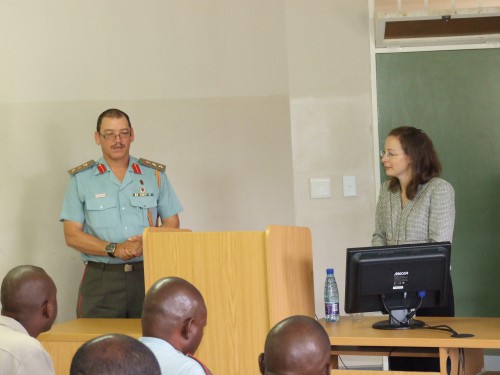21st October 2011 Windhoek, Namibia
Making the Commonwealth count
Queen Elizabeth II has arrived in Australia for this year’s Commonwealth Heads of Government (CHOGM) meeting. She will be joined by head of states from across the organisation’s diverse membership, including President Pohamba and a sizeable Namibian delegation, including the Ministers of Foreign Affairs and Trade & Investment.
A key focus of this year’s event in Perth will be discussions on ensuring that the Commonwealth modernises to remain a relevant and beneficial force in this modern era.
The Commonwealth is a truly unique organisation. Its wide and diverse membership makes it ideally placed to be a leading 21st Century global soft power network.
For those of you who don’t know much about the organisation, let me provide a bit of background: the Commonwealth is a voluntary association of 54 countries that support each other and work together towards shared goals in democracy and development. The world’s largest and smallest, richest and poorest countries are members of the Commonwealth, which is home to two billion citizens of all faiths and ethnicities – over half of whom are 25 or under. Member countries span six continents and oceans – from Africa (19) to Asia (8), the Americas (2), the Caribbean (12), Europe (3) and the South Pacific (10).
This year’s CHOGM offers an important opportunity to modernise the organisation to the benefit of all its members. The UK is committed to ensuring it remains relevant, realises its great potential, and brings strong values, development and prosperity to all its citizens.

In August, I travelled to Okahandja to give a speech to officers at the Military Training Academy on the relevance of the Commonwealth in the 21st century. I discussed the history of the Commonwealth as a leading international organisation, but also focused on explaining why the British government has increased its commitment to the Commonwealth as a key international organisation.
To quote from my speech:
“Last year, the UK had a change of government. A new Conservative and Liberal Democrat Coalition came into power and promised to put the Commonwealth back at the very heart of British foreign policy for the first time in more than a decade. My Foreign Minister, the UK’s Foreign Secretary, William Hague, announced in a key speech at the Commonwealth Parliamentary Association, that the Commonwealth was the cornerstone of our foreign policy, alongside our role in the EU and, our membership of NATO.
But why you may ask?
The reason is simple. As I have explained to you this morning, in a modern world that is more and more dominated by networks, the Commonwealth is the ultimate network.
It has extraordinary reach across 54 countries, six continents and oceans, and 2 billion citizens. It is united by the same principals of liberty, democracy and human rights, but at the same time it is extraordinarily diverse: demonstrating that democracy allows countries to develop in their own ways and provide essential foundations for sound economic development.
In terms of tangible benefits, the Commonwealth is a source of great economic dynamism for its member states, containing some of the fastest growing new economies in the world. These are countries that will shape the global economy of the future and to which we all have our own ready-made connections through the Commonwealth and its increasingly intensive network of trade and investment flows.
Looking ahead
The next Commonwealth Heads of Government meeting takes place this October in Perth, Australia. The UK government is working hard with members across the association to build support for a stronger and more effective Commonwealth for the future.
We have identified scope for change in three important areas:
Firstly, strengthening the Commonwealth’s work on human rights and democracy. There is a greater role for the organisation in speaking out against political oppression, religious intolerance and racism, with all the authority its broad membership affords. At a time when people in the Middle East and North Africa are seeking in their thousands the same rights as we enjoy in our countries, the Commonwealth should not shy away from a larger role in promoting human rights and democracy.
Secondly, we see great potential for the Commonwealth to increase its engagement on global economic issues. As I have already said, the association includes many of the fastest growing technologically advanced economies in the world – a combined GDP that has more than doubled in the last 20 years. The Commonwealth could, and should, become one of the leading voices in the global economy, working to liberalise trade and break down barriers for international business.
Thirdly, we would also like to see the Commonwealth assert an even greater role in development and conflict prevent going forward.
And this is the part that is most relevant to you all here.
Part of this is what the Commonwealth can do for other countries through its example or through practical assistance. We see scope for an even greater Commonwealth role in fragile states and young democracies, a mission which should be given even greater importance in the light of the transformation now underway in Tunisia, Egypt and other parts of the Middle East and North Africa.”
So I hope that provides you with a useful background on the association, what is set to take place in Perth, where the UK is coming from and helps to illustrate that in today’s modern world, the Commonwealth remains a powerful global brand that many millions of people around the world are proud to be associated with.
My team here in Windhoek will continue to follow events in Perth with great interest over the coming days.
